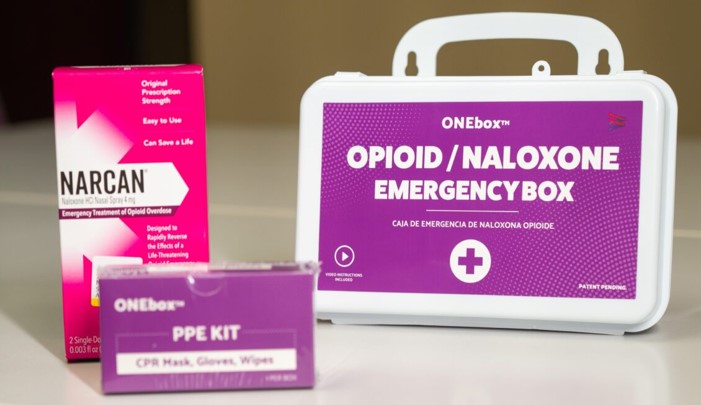- Home
- Campus Life
- Campus Recreation & Wellness
- Student Wellness Programs
- Substance Education
- Education & Risk Reduction
- Opioid Overdose Prevention and Awareness
Opioid Overdose Prevention and Awareness
Opioid overdose is life-threatening and requires immediate emergency attention. If you suspect an overdose, ALWAYS call 9-1-1 first before taking any other action. Recognizing the signs of an opioid overdose is essential to saving lives.
Signs and Symptoms of an Opioid Overdose
- unconsciousness or unresponsiveness (doesn’t wake up when shaken or called)
- shallow breathing
- limpness
- blue lips, gums, or fingertips
- slow or irregular heartbeat or pulse
What is Fentanyl?
Fentanyl, a powerful synthetic opioid – up to 100x more potent than morphine and 50x stronger than heroin is the primary driver of overdose fatalities in the United States. Fentanyl is increasingly mixed in combination with other substances thus heightening the potential risk of an unintentional overdose.
What is Naloxone?
Naloxone (commonly known as Narcan®) is a medication that can reverse an overdose caused by an opioid drug (heroin, fentanyl, or prescription pain medication). When administered during an overdose, Naloxone blocks the effects of opioids on the brain and quickly restores breathing.
Naloxone has been used safely by emergency medical professionals for more than 40 years and has only one critical function: to prevent overdose death by reversing the effects of opioids.
Naloxone does not reverse or treat an alcohol overdose/alcohol poisoning.
For more information visit the National Institute on Drug Abuse (NIDA)
Where can I find Naloxone?
Naloxone is available under the statewide standing order through participating pharmacies which means consumers can get Naloxone directly from a pharmacist, without a prescription. This allows greater access to Naloxone to anyone who thinks they might need it, either for themselves or for someone else who might be at risk for an overdose.
Over-the-counter Naloxone nasal spray was approved by the Food and Drug Administration (FDA) in 2023 and is available without a prescription.
About ONEboxTM
The ONEbox (TM) is an emergency opioid overdose reversal kit designed to promote safety by ensuring that individuals have access to life-saving medication and on-demand training when needed. To proactively address the risk of an unintentional overdose, ONEbox toolkits are located across campus in designated residence hall common areas.
Each ONEbox contains:
- Naloxone, a life-saving medication that can quickly reverse the effects of an opioid overdose; and
- An on-demand training video to aid in bystander intervention during an emergency overdose situation.
If you suspect an opioid overdose, always call 911 first before taking any other action.

Where can I find ONEbox?
Look for the Purple ONEbox emergency toolkit next to the AED devices in the residential neighborhood common buildings.
Campus Locations
- Global Commons – From the main entrance, ONEbox is located on the right side next to the Global Neighborhood office.
- Colonnades (Kivette) – ONEbox is located to the left as you enter the building’s main entrance.
- Danieley (Daniel Commons) – ONEbox is on the right wall when entering from the side entrance adjacent to Dan G.
- Historic (LaRose) – When entering from the main door ONEbox is located on the right wall towards the offices.
- Mill Point (Love Student Commons) – Enter through the main entrance, ONEbox is located on the right in the middle of the wall.
- Oaks (McCoy Commons) – Enter through the main door, ONEbox is located on the right next to the HVAC room.
- Park Place – When entering through the door at the rear of the building, ONEbox is located on the wall to the left, next to room number 115.
Community Locations
In Alamance County, Naloxone is carried by the following law enforcement offices:
In addition, the Alamance County Health Department provides free Narcan nasal spray via a vending machine. The Narcan kiosk is located in the main entrance lobby of the Human Services Center. It is open to the public during normal business hours (8:00AM – 5:00PM).
In North Carolina there are four ways to find Naloxone:
- Syringe service programs that offer naloxone
- NC health departments that offer naloxone
- North Carolina pharmacies that offer naloxone
- Talk to your medical care provider about getting naloxone
Campus Resources
Training Resources
- 5-Minute Opioid Response Training
- Extended Opioid Response Training (In this brief 30-minute training, participants learn what an opioid overdose is, how to recognize one, and how to save a life with Naloxone).
What to Do if You Suspect Overdose
- Call 911
- Say “I can’t wake my friend up”
- Roll the person into the recovery position (see image)
- Stay with the person

Sources: NC Department of Health and Human Services, Division of Public Health (December 2023)